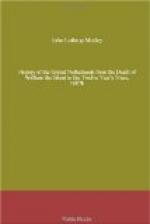Ybarra went about, too, prating to the archdukes and to others of supplies to be sent from Spain sufficient to carry on the war for many years, and of fresh troops to be forwarded immediately by Fuentes. As four millions of crowns a year were known to be required for any tolerable campaigning, such empty vaunts as these were preposterous. The king knew full well, said Spinola, and had admitted the fact in his letters, that this enormous sum could not be furnished. Moreover, the war cost the Netherlanders far less in proportion. They had river transportation, by which they effected as much in two days as the Catholic army could do in a fortnight, so that every siege was managed with far greater rapidity and less cost by the rebels than by their opponents. As to sending troops from Milan, he had already stated that their arrival would have a fatal effect. The minds of the people were full of suspicion. Every passing rumour excited a prodigious sensation, and the war party was already gaining the upper hand. Spinola warned the king, in the most solemn manner, that if the golden opportunity were now neglected the war would be eternal. This, he said, was more certain than certain. For himself, he had strained every nerve, and would continue to do his best in the interest of peace. If calamity must come, he at least would be held blameless.
Such vehement remonstrances from so eminent a source produced the needful effect. Royal letters were immediately sent, placing full powers of treating in the hands of the marquis, and sending him a ratification of the archduke’s agreement. Government moreover expressed boundless confidence in Spinola, and deprecated the idea that Ybarra’s mission was in derogation of his authority. He had been sent, it was stated, only to procure that indispensable preliminary to negotiations, the withdrawal of the Dutch fleet, but as this had now been granted, Ybarra was already recalled.
Spinola now determined to send the swift and sure-footed friar, who had made himself so useful in opening the path to discussion, on a secret mission to Spain. Ybarra objected; especially because it would be necessary for him to go through France, where he would be closely questioned by the king. It would be equally dangerous, he said, for the Franciscan in that case to tell the truth or to conceal it. But Spinola replied that a poor monk like him could steal through France undiscovered. Moreover, he should be disguised as a footman, travelling in the service of Aurelio Spinola, a relative of the marquis, then proceeding to Madrid. Even should Henry hear of his presence and send for him, was it to be supposed that so practised a hand would not easily parry the strokes of the French king—accomplished fencer as he undoubtedly was? After stealing into and out of Holland as he had so recently done, there was nothing that might not be expected of him. So the wily friar put on the Spinola livery, and, without impediment, accompanied Don Aurelio to Madrid.




